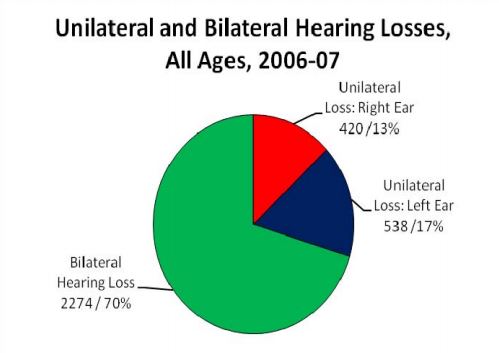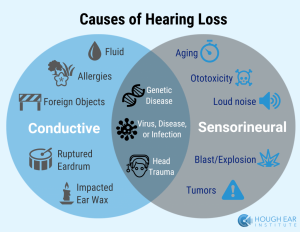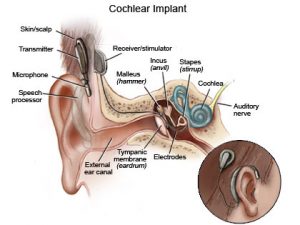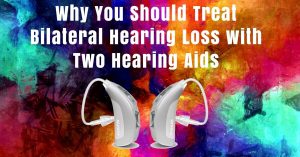Hearing loss is a common problem. And today we are aware of the different categories of hearing disability like temporary or permanent, full or partial, sensorineural or conductive hearing loss.
It differs from one person to another person. Though we are familiar with the synonyms of deafness, we should know about them in detail in order to improve our hearing.
You can purchase the latest hearing aids at a fair price through HearingSol, If you need any assistance or you have a query regarding Bilateral Hearing Loss, feel free to call us at +91-9327901950. We are always here to help you.
Previously, we have discussed hearing loss in one ear that is unilateral hearing loss. Similarly, there exists a term for a hearing loss in both the ears, which is known as a bilateral hearing disorder. Though it is a simple and unique term as unilateral hearing loss, there are quite differences between the two. Let’s discuss the aspects of bilateral hearing disability in detail.
What Is Bilateral Hearing Loss?
When you are suffering from hearing impairment in both the ears, it is called a bilateral hearing loss. Therefore it makes you unable to hear the sounds from both the ears. This can either be symmetrical or asymmetrical.
Symmetrical: When the degree of hearing disorder is equal in both the ears it is known as asymmetrical bilateral hearing loss.
Asymmetrical: When the degree of deafness in both the ears differs, it is known as an asymmetrical bilateral hearing loss. That is your one ear hears better than the other. But in both cases, there is a disorder in both the ears.
Progressive Bilateral Hearing Loss
When there is a significant decline in the hearing ability in both the ears at the same time, it is called a progressive bilateral hearing loss. Its duration may be rapid and slow. Rapid over several months and slowly over the years.
Autoimmune inner ear disease is an example of progressive bilateral hearing loss.

Sudden bilateral hearing loss occurs 20 times less commonly than sudden hearing loss in one ear (Oh et al, 2007). According to Chen and Young (2016), the prognosis is very poor for sudden bilateral hearing loss with a very high mortality rate (44%) in 16 patients over 5 years.
Progressive Bilateral deafness is more popular than the unilateral. Like nearly 100% of the population eventually develops age-related bilateral hearing loss.
What conditions will cause deafness in both ears? How these cases are different from those of single-sided deafness. Perhaps, you will get these answers in the further section.
How Bilateral Hearing Loss Is Different From Normal Hearing Loss?
There is a huge difference between bilateral hearing loss and normal hearing loss. The normal hearing loss may occur in both or one ear but the bilateral hearing loss can occur in both ears that may be caused by the inner, middle, outer ear, or a combination of these areas. It is reduced the hearing ability in both ears. Normal hearing loss can be recovered by medicine or antibiotics but surgery or best hearing aid is the best solution for bilateral hearing loss treatment.
Thus in order to understand the differences between them, you should first know the difference between normal hearing and bilateral hearing. Normal hearing ranges from 0 to 20dB ie from 20Hz to 20000Hz. The bilateral hearing refers to the hearing with the help of the bilateral hearing aids. Let’s discuss the differences between the two.
Differences Between Normal & Bilateral Hearing Loss
The bilateral hearing loss is different from normal hearing loss in the following aspects :
Normal hearing loss refers to the partial or complete inability to hear. It may affect one or both ears. But bilateral hearing loss refers to the inability of both the ears to hear. Therefore it affects both the ears. As we can say that bilateral loss is a component or part of the normal hearing loss. The normal hearing loss includes both unilateral as well as bilateral hearing loss.
They also differ in their symptoms. Normal hearing loss may affect one or both ears. But in bilateral hearing loss, you will face difficulty in hearing from both sides. Bilateral hearing loss is more threatening, complex as compared to the normal hearing loss. The symptoms, as well as causes, are similar in case of normal hearing loss as well as bilateral.
But they are slightly different. In the normal hearing loss, you will face problems in one or both ears like irritating sounds, muffling or whispering of people, ear pain, the ringing of ears. But in the case of bilateral, you will observe the symptoms in both ears.
You may need a hearing aid for normal hearing loss but in case of bilateral hearing loss, you need bilateral hearing aids for better hearing.
Thus they both are slightly different from each other. But in maximum terms, both are similar in causes, symptoms, and treatment methods.
Bilateral Hearing Loss Causes

The bilateral hearing loss may be caused by factors in the outer, middle or inner ear or a combination of these areas. Bilateral hearing loss can be categorized as sensorineural, conductive, or mixed hearing loss. Well, the types of hearing loss depend on the factors involved with it.
Sensorineural Bilateral Hearing Loss
If the hearing loss in your ears is the result of congenital or acquired hearing loss, it may lead to Sensorineural bilateral hearing loss. It is termed as nerve deafness as it is the combination of dual problems:
- Sensory loss involving the inner ear
- Neural loss involving the hearing nerve
It is caused due to the following factors :
Congenital factors: These factors are present at birth which leads to nerve deafness. It may be due to genetic factors or abnormal development in the fetal stages of life. Prior to the development of the vaccine, Maternal Rubella or German Measles were responsible for congenital hearing loss.
Acquired factors: Factors like aging, loud noise, certain medications, trauma, head injury, ototoxic drugs, etc are responsible for sensorineural bilateral hearing loss. These factors are acquired after birth and are not genetic.
Conductive Bilateral Hearing Loss
If there is a blockage or reduction in your ears’ ability to conduct sound into the inner ear, you are suffering from conductive bilateral hearing loss. It leads to the breakdown in the effectiveness of sound waves being passed from the outer ear. This form of hearing loss is far more commonly associated with physical damage, including perforation of the eardrum or a large build-up of wax.
Mixed Bilateral Hearing Loss
If the bilateral hearing loss is both conductive as well as sensorineural, it is termed as mixed bilateral hearing loss.
Therefore, the following common causes are responsible for the above bilateral hearing loss:
Aging – Everyone suffers hearing impairment in both the ears due to the increase in age as it is a natural phenomenon. It is a slow process and takes over the ears.
Loud noise – The sounds of loud music and concerts, gunshots, crackers exceeds 85 decibels can damage both the ears at the same time.
Ototoxic drugs – Certain medications like acetaminophen, ibuprofen contain ototoxic drugs that will lead to bilateral hearing loss.
Meniere’s disease – An inner ear disease causes vertigo, dizziness, nausea, and hearing loss. It usually occurs in steps, one ear at a time but slowly it affects both the ears.
Meningitis – Viral or bacterial infection causes a headache, affects the brain working and the spinal cord.
Otosclerosis – It leads to abnormal growth of bone within the middle ear that stops these bones from vibration. As a result, sound waves are unable to reach the inner ear and triggers hearing loss.
Autoimmune disorders such as Cogan’s Syndrome can affect the ears.
Genetic factors – Inherited factors like mutations, genetic syndromes, etc can lead to bilateral hearing loss.
Ear wax blockage – The accumulation of excess ear wax blocks the ear canal and you may find difficulty in hearing from both the ears.
Ear Infections – The infections due to fluid in the middle, inner, or outer ear may affect both the ears at the same time.
Alcohol and tobacco – The toxicity of drugs and their carcinogens pose a threat to the tiny hearing cells of the cochlea.
Depression – This mood disorder affects the inner ear and slowly reduces the hearing ability of both the ears.
Superficial siderosis – Due to iron deposition, generally from a leak close to the 8th nerve, it causes hearing loss over the years.
Chiari Malformation – It is caused by the displacement of the cerebellar tonsils below the level of the foramen magnum. It causes aural fullness, tinnitus, vertigo, and hearing loss in both ears.
Stroke – It affects the auditory pathway and causes difficulty in perception or reception of sound.
Head trauma – Accidents or physical injuries can damage your inner ear and leads to a ruptured eardrum. Thus it may lead to bilateral hearing loss.
Acoustic neuroma – It is a tumor in the nerve that grows and affects the auditory nerve.
Suppose you are facing various hearing problems, but the main point is to know the type of hearing loss you are suffering from. How will you know whether your hearing loss is unilateral or bilateral? The symptoms will reveal your type and help you to alert to your problem.
Bilateral Hearing Loss Symptoms
As we have discussed the causes of bilateral hearing loss in the above sections, it is mandatory to identify the signs on the basis of causes. As the causes and effects are related to each other. If you are facing the following problems frequently, then there is a problem with your both ears.
In the bilateral hearing loss, you are likely to show the following symptoms which are as follows :
- Inability to hear from both sides at the same time or at different times. Though your ears are affected, you may experience that one ear hears better than the other ear.
- Inability to hear the people clearly as their speaking seems to be muffling or whispering.
- Frequent requests for repetition and clarification.
- You may feel disturbing noises like ringing, hissing, cracking, etc in both the ears.
- You may experience ear pain from both sides frequently or suddenly.
- Fatigue at the end of the day due to difficulty in hearing from the ears.
- You tend to avoid social gatherings and group conversations due to hearing loss in both the ears. As you may experience the frequent ups and downs in the frequencies of the sound.
- Hearing disorders will ultimately lead to social, communication, and speech disorder. You may face difficulty in speaking as well as listening.
- The tendency to bluff when not hearing someone because of the fear of asking them to repeat themselves.
- Bilateral hearing loss may cause loneliness, anxiety, and cognitive disorders. Then you may find yourself socially and emotionally depressed.
If you are suffering from the above problems, then it is the possibility of bilateral hearing loss. You should immediately report to your nearby audiologists for diagnosis and further treatment.
How To Treat Bilateral Hearing Loss?
Well, bilateral hearing loss involves sensorineural, conductive and mixed hearing loss, thus there treatment will be based upon the relying factors. As the treatment of bilateral hearing loss depends upon the degree of a hearing loss in both the ears, you should immediately consult your nearby audiologists for diagnosis and further treatment.
Bilateral Hearing Loss Differential Diagnosis
Prior to the treatment, diagnosis is necessary to reveal the actual cause behind your hearing loss and the degree of hearing loss your ears are suffering. An audiologist may refer to the following diagnostic procedures for your ears :
An otoscopic and physical examination along with the questions related to your symptoms and other factors. Afterward, he may refer to the following hearing tests :
- Laboratory tests (Tests of blood, fluid, pus, etc)
- Rinne and Weber’s Test
- Tuning fork evaluation
- Audiometry tests (Common hearing tests)
Treatment of Bilateral Hearing Loss

Generally, the treatment of bilateral hearing loss involves medical intervention, surgery, and hearing aids.
Some cases of bilateral hearing loss may be treated by surgery or cochlear implants. While some of them include only the use of hearing aids. In some cases of bilateral hearing loss, you need surgery as well as hearing aids. Whether you need one or two hearing aids for your ears. It all depends on the degree of hearing loss you are suffering.
How Do Binaural Hearing Aids Work?

If your hearing loss is severe you need hearing aids in both the ears, which is called binaural hearing aids. By binaural hearing aids, the sound is able to reach and stimulate each ear auditory nerve, keeping the nerve actively engaged. According to recent studies, if the sound doesn’t stimulate auditory nerves, they can slow down and make hearing loss worse. This condition is Auditory Deprivation. Hearing aids keep our auditory nerves functioning, which lowers the risk of Auditory Deprivation.
It helps in listening to the sounds in a normal environment as well as the noisy environment. One hearing aid helps in understanding the speech and the other diminishes the background noise. Two hearing aids let you listen to normal volumes, which minimizes sound distortion and auditory fatigue.
Bilateral Hearing Loss VA Disability
The VA rates your disability between 0 and 100 percent in increments of 10. At a rating of 0 percent, you do not receive monthly compensation, but you might be eligible for other benefits from the VA, such as health care. Typical ratings for hearing loss are 0% or 10%, but severe or profound hearing loss can qualify for a higher rating.
Social Security grants disability for profound hearing loss in both ears. Social Security disability benefits are available for profound hearing loss or deafness, but not for moderate or mild hearing loss. The disability rating for loss of one or both ears (auricles), rated at 30% for loss of one ear or 50% for loss of both.
Therefore, If you are eligible for service-connected disability compensation and you are suffering hearing loss in both ears, you are entitled to an additional monthly cash benefit called special compensation.
You can purchase the latest hearing aids at a fair price through HearingSol, If you need any assistance or you have a query regarding Bilateral Hearing Loss, feel free to call us at +91-9327901950. We are always here to help you.
For more info:-
